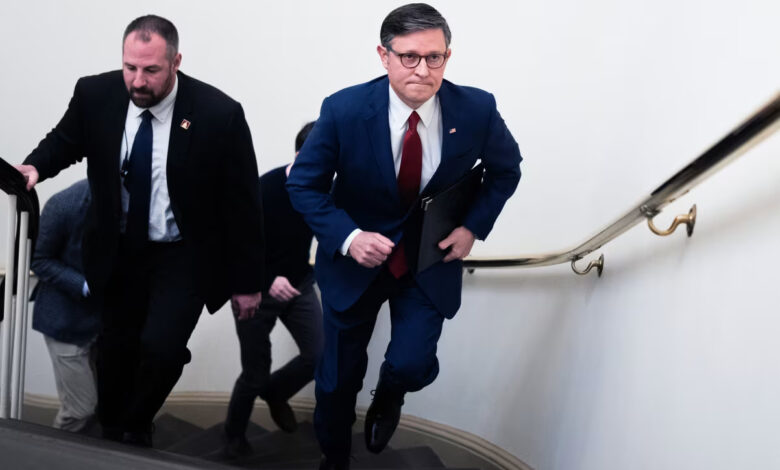
Welcome back, members of the US House of Representatives. The world has changed since you’ve been gone.
Since the House cast its last vote, on September 19 — well before the longest government shutdown in history started — Donald Trump has brokered a ceasefire between Israel and Hamas and traveled to Asia and back. The East Wing of the White House has disappeared under the president’s wrecking ball. A World Series has been won, and Taylor Swift told the globe about “The Life of a Showgirl.”
But the House has remained stubbornly clamped shut by House Speaker Mike Johnson, in a remarkable power play that mirrored the convention-busting strategies of the president to whom he owes his gavel. The Louisiana Republican justified the closure by arguing that he had nothing to negotiate over until Democrats caved.
The House is due to finally convene on Wednesday and to vote on a Senate bill to end the record-breaking impasse on its 43nd day, assuming members make it to Washington through the shutdown-inflicted chaos in commercial aviation. One Republican, Rep. Derrick Van Orden of Wisconsin, is going above and beyond, riding his Harley-Davidson motorbike all the way to DC despite frigid temperatures. “It’s going to be a little chilly, but I will do my duty,” the former Navy SEAL said in an online video.
One benefit for Johnson of leaving his lawmakers at home during the shutdown is that he kept a lid on public dissent. But calling the House back could rip the top off weeks of festering frustration and divisions, especially since the tiny GOP majority makes the speaker’s job a constant trial even in normal circumstances.
Assuming he can engineer the reopening of the government — and nothing can be taken for granted in the fractious GOP conference — Johnson faces a treacherous path to the holiday season with a crush of pending legislation. Another government funding showdown already looms in late January. As always, Trump’s backing with be critical. The president’s comment to CNN’s Kaitlan Collins on Monday that he supported the bill to reopen the government may keep Johnson’s conference in line.
By sticking firm to his vow to keep the House out until the shutdown ended, Johnson could claim to have emerged on the right side of the crisis — as much as anyone could call themselves a winner in a six-week abdication of the government’s role that left more than 1 million federal workers without pay and millions of Americans without vital nutrition benefits.

Johnson’s long list of controversies
But the speaker’s life is about to become even more complicated. To begin with, he’s left holding the bag on the issue that caused Senate Democrats to refuse to fund the government and initiate the shutdown — expiring enhanced subsidies for Affordable Care Act policyholders whose premiums are soaring in price.
Johnson is hearing calls from vulnerable GOP members to hold a vote on extending those subsidies, to match the one in the Senate that Republicans promised in exchange for the reopening of the government. But if he did so, he’d split his conference and alienate many conservatives who’d probably rather do anything than save Obamacare, which they despise.
A bill might pass with the help of Democrats — but that would surely risk his shaky hold on the speakership. If he refuses to act, he might trigger a rebellion on his own benches and a discharge petition to force a vote over the wishes of the leadership.
Republican House members have also been at home for weeks in which Trump’s approval ratings dipped as many Americans struggle to deal with food, housing and health care costs. The party’s vulnerability on the issue was underscored by bigger-than-expected Democratic wins in governor’s races in Virginia and New Jersey last week. Only those Republicans with a national platform — like Georgia Rep. Marjorie Taylor Greene — have been able to beat the GOP blackout to raise vehement concerns. But that may change when the restive GOP gang is back in town, even as Trump blasts what he calls “fake” polls showing Americans are feeling anxiety over their economic circumstances.
But things will get worse for Johnson.

By reconvening the House, he’ll revive the scandal over convicted sex offender Jeffrey Epstein, which has been dormant, much to the White House’s satisfaction during the shutdown. The speaker on Wednesday will be finally forced to swear in Democratic Rep. Adelita Grijalva, who won a special election in Arizona in September. His refusal to do so before now was controversial because she promised to provide the final signature on a petition to force a vote on a bipartisan move to defy Johnson and require the Justice Department to release the Epstein files.
There is no suggestion of wrongdoing by the president in relation to Epstein, who took his own life in prison in 2019. But his past friendship with his fellow Florida and New York resident has haunted his White House for months and raised questions about the administration’s refusal to release the case files.
There was no constitutional reason why the House had to remain closed during the shutdown. The Senate was in, voting repeatedly on futile GOP efforts to reopen the government and to get Democrats on record as keeping it closed. But behind the scenes, senators also took significant steps to clear appropriations bills covering military construction, the Department of Agriculture and veterans affairs, which are included in the funding package that will reopen the government.
The House’s absence was a further example of the legislative branch’s voluntary ceding of its powers to the executive during Trump’s presidency, even if the pliant GOP majority has hardly shown much zeal for conducting oversight of the administration.
As a former back-bencher whom no one expected to become speaker, Johnson has often shown deft management of his conference in difficult circumstances. Yet his dependence on Trump means critics often view him as the president’s lackey on Capitol Hill.

‘Long time, no see’
The first order of business for returning lawmakers was a meeting of the House Rules Committee on Tuesday evening to vote to advance legislation that will be used to reopen the government and restore paychecks for federal workers. It was not a happy reunion.
Republican committee Chair Virginia Foxx lashed Democrats, who she claimed had deluded themselves into thinking they were doing right by the American people. They ended up with a “big fat nothingburger” over the shutdown, she said.
But the committee’s top Democrat, Jim McGovern, sarcastically welcomed Republicans back. “Long time, no see,” he said, blasting the Republican no-show during the shutdown as one of the most embarrassing spectacles in modern congressional history and claiming GOP members “quiet-quit their jobs.”
On more substantive matters, Johnson is coming under intense heat to help millions of Americans who are currently agonizing over whether to sign up for new Obamacare premiums they can’t afford or to tempt fate and drop coverage.
New York Rep. Mike Lawler, one of the most vulnerable GOP members ahead of the midterm elections next year, renewed his call Tuesday for a renewal of the enhanced ACA subsidies for one year, but also demanded reforms to the 15-year-old law. “Health insurance premiums continue to rise despite the promise of Obamacare,” Lawler told CNN’s Brianna Keilar. “There is a short-term issue of extending the premium tax credit and a longer-term issue of how we actually reduce the cost of health care in America,” Lawler said.
But Johnson has still not committed to holding a vote on extending the subsidies. “The problem is, when you’re subsidizing insurance companies, they just jack the rates up even higher,” Johnson told CNN’s Jake Tapper on Monday.
That may be the case, but there’s no chance a more fundamental reform of Obamacare can make it through Congress during the current open enrollment period — even in the unlikely event there was the bipartisan political will to pass such a bill.
“I’m not committing to it or not committing to it. What I’m saying is that we do a deliberative process. It’s the way this always works, and we have to have time to do that, and we will in a bipartisan fashion,” Johnson told Tapper.

Still, Republicans could end up paying a heavy political price if they are blamed, despite prevailing in the shutdown, for skyrocketing premiums — ironically under a law that they’e long tried to destroy.
Tim Burchett, a Republican representative from Tennessee, said he would prefer to fix Obamacare “and give the American public a decent program” rather than extend existing subsidies. He told CNN’s Kasie Hunt it was time to bring patients and doctors together and to tell insurance companies to “take a flying leap because they have screwed this program up by their greed.”
Burchett said both parties needed to “suck it up” and start voting on solutions. “Everybody talks real tough on this issue … but nobody wants to do anything about it,” he said.
Any genuine attempt to reform Obamacare would have to defy the unpromising political circumstances of the minuscule House majority, Johnson’s own tenuous position and the way that approaching elections tend to stall major reform efforts. Then there is Trump’s typically haphazard approach to health care, which, spanning two presidential terms, has been marked by big promises but no action.
Democrats, meanwhile, return to the House in almost unanimous agreement that their moderate brethren in the Senate who voted with Republicans to end the shutdown had betrayed their voters. But their view that a president who was willing to inflict pain on millions of other Americans during the shutdown had been about to cave defies credulity. It’s more a vision of the world as they’d prefer it to be, not the reality of Washington, where they have almost no power to work their will.




